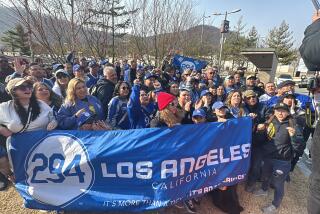Tourists Fly to N. Korean Capital
- Share via
SEOUL — As one of South Korea’s most celebrated mountain climbers, Huh Young Hee has ventured where few others dare to tread. He has scaled peaks on five continents and twice reached the summit of Mt. Everest.
It was with the same sense of accomplishment that Huh boarded Air Koryo Flight 916, the first commercial flight in more than half a century from South Korea to Pyongyang, the capital of North Korea.
“I can go to the North Pole or the South Pole whenever I want. That is easy compared to getting to North Korea,” Huh quipped as he walked through the security gate at Seoul’s Inchon International Airport.
The historic flight left at 10:30 a.m. Monday carrying 114 South Korean tourists for a five-day journey through North Korea. For all practical purposes, the trip to Pyongyang was a short commuter hop -- a little over an hour -- but in the larger scheme of inter-Korean relations it was a giant leap forward.
Even with the Koreas’ rapprochement of recent years, the North has rarely admitted South Korean tourists into its capital, and then only by circuitous routes through China. Direct flights have taken place rarely and only for official delegations.
The charter flight that left Monday was run by Pyonghwa Travel Agency, which is largely owned by members of the Rev. Sun Myung Moon’s Unification Church. The agency intends to take about 2,000 South Korean tourists to Pyongyang on another 19 flights by the end of the year, when the current program ends. Air Koryo is the North Korean state airline.
The first group of tourists, who waited months for the flight to be approved, consisted mostly of older people who were born in North Korea and fled south during the 1950-53 Korean War.
As the gate information for Flight 916 flashed on the departure board at the airport, a ripple of excitement passed through the crowd as travelers rushing to their gates for other flights looked up to see Pyongyang listed among the customary destinations.
But some grumbled that the flight itself was less surprising than the fact that it had taken so long.
“This is nonsense. It is too late,” said Kim Sin U, a 64-year-old doctor, who fled the North as a child and has been trying ever since to get back to see his younger brothers. He has applied repeatedly for a government-sponsored reunion, without success.
“I’ve been everywhere else in the world -- the U.S., Europe, South America, but not North Korea,” he complained.
Until now, the only part of the North that has been accessible to Southern tourists is an isolated enclave around Mt. Kumgang on the southeastern coast, where an affiliate of the giant Hyundai corporation has run guided tours by boat for five years.
The Pyonghwa group has rapidly been making inroads into North Korea, taking over some of the leadership role from Hyundai, whose chairman committed suicide last month amid a political bribery scandal. Pyonghwa has two hotels and an auto assembly plant in North Korea. This year it became the first foreign company permitted to advertise on North Korean TV, with a seven-minute infomercial about its car production.
“This is not about politics. This is business,” said Kim Byung Kyu, a Pyonghwa director, explaining the company’s dealings with the North. “The North Koreans want to make some money. Of course, they want to show off a positive image of their country to South Koreans, but that is not the main purpose.”
The tours for now are open only to South Koreans. Pyong- hwa officials said the North would eventually permit some foreigners -- including U.S. citizens, if they are of Korean origin -- to take the flights. But many other restrictions apply.
In advance of Monday’s flight, travelers were carefully briefed on a strict code of conduct to follow in North Korea. They were told not to bring newspapers, not to talk about politics, not to attempt to contact any family members or talk to North Koreans about missing family members, not to give money or gifts, and not to say anything that could be construed as rude.
“Even if the food is bad, we have to say it is delicious,” said Lee Bok Ku, 67, whose husband was born in North Korea, as she waited to board the flight.
More to Read
Sign up for The Wild
We’ll help you find the best places to hike, bike and run, as well as the perfect silent spots for meditation and yoga.
You may occasionally receive promotional content from the Los Angeles Times.






